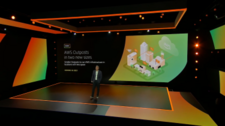Upgrade & Secure Your Future with DevOps, SRE, DevSecOps, MLOps!
We spend hours on Instagram and YouTube and waste money on coffee and fast food, but won’t spend 30 minutes a day learning skills to boost our careers.
Master in DevOps, SRE, DevSecOps & MLOps!
Learn from Guru Rajesh Kumar and double your salary in just one year.
Source:-https://techcrunch.com
AWS today closed out its first re:Invent keynote with a focus on edge computing. The company launched two smaller appliances for its Outposts service, which originally brought AWS as a managed service and appliance right into its customers’ existing data centers in the form of a large rack. Now, the company is launching these smaller versions so that its users can also deploy them in their stores or office locations. These appliances are fully managed by AWS and offer 64 cores of compute, 128GB of memory and 4TB of local NVMe storage.
In addition, the company expanded its set of Local Zones, which are basically small extensions of existing AWS regions that are more expensive to use but offer low-latency access in metro areas. This service launched in Los Angeles in 2019; starting today it’s also available in preview in Boston, Houston and Miami. Soon, it’ll expand to Atlanta, Chicago, Dallas, Denver, Kansas City, Las Vegas, Minneapolis, New York, Philadelphia, Phoenix, Portland and Seattle. Google, it’s worth noting, is doing something similar with its Mobile Edge Cloud.
The general idea here — and that’s not dissimilar from what Google, Microsoft and others are now doing — is to bring AWS to the edge and to do so in a variety of form factors.
As AWS CEO Andy Jassy rightly noted, AWS always believed that the vast majority of companies, “in the fullness of time” (Jassy’s favorite phrase from this keynote), would move to the cloud. Because of this, AWS focused on cloud services over hybrid capabilities early on. He argues that AWS watched others try and fail in building their hybrid offerings, in large part because what customers really wanted was to use the same control plane on all edge nodes and in the cloud. None of the existing solutions from other vendors, Jassy argues, got any traction (though AWS competitors would surely deny this) because of this.
The first result of that was VMware Cloud on AWS, which allowed customers to use the same VMware software and tools on AWS they were already familiar with. But at the end of the day, that was really about moving on-premises services to the cloud.
With Outposts, AWS launched a fully managed edge solution that can run AWS infrastructure in its customers’ data centers. It’s been an interesting journey for AWS, but the fact that the company closed out its keynote with this focus on hybrid — no matter how it wants to define it — shows that it now understands that there is clearly a need for this kind of service. The AWS way is to extend AWS into the edge — and I think most of its competitors will agree with that. Microsoft tried this early on with Azure Stack and really didn’t get a lot of traction, as far as I’m aware, but it has since retooled its efforts around Azure Arc. Google, meanwhile, is betting big on Anthos.
